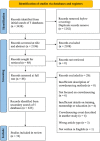Crowdsourcing to support training for public health: A scoping review
- PMID: 37494311
- PMCID: PMC10370701
- DOI: 10.1371/journal.pgph.0002202
Crowdsourcing to support training for public health: A scoping review
Abstract
Crowdsourcing is an interactive process that has a group of individuals attempt to solve all or part of a problem and then share solutions with the public. Crowdsourcing is increasingly used to enhance training through developing learning materials and promoting mentorship. This scoping review aims to assess the literature on crowdsourcing for training in public health. We searched five medical and public health research databases using terms related to crowdsourcing and training. For this review, the concept of crowdsourcing included open calls, designathons, and other activities. We used a PRISMA checklist for scoping reviews. Each full-text was assessed by two independent reviewers. We identified 4,071 citations, and 74 studies were included in the scoping review. This included one study in a low-income country, 15 studies in middle-income countries, 35 studies in high-income countries, and 11 studies conducted in multiple countries of varying income levels (the country income level for 12 studies could not be ascertained). Nine studies used open calls, 35 used a hackathon, designathon or other "a-thon" event, and 30 used other crowdsourcing methods, such as citizen science programs and online creation platforms. In terms of crowdsourcing purpose, studies used crowdsourcing to educate participants (20 studies), develop learning materials (17 studies), enhance mentorship (13 studies) and identify trainees (9 studies). Fifteen studies used crowdsourcing for more than one training purpose. Thirty-four studies were done in-person, 31 were conducted virtually and nine used both meeting options for their crowdsourcing events. Seventeen studies generated open access materials. Our review found that crowdsourcing has been increasingly used to support public health training. This participatory approach can be a useful tool for training in a variety of settings and populations. Future research should investigate the impact of crowdsourcing on training outcomes.
Copyright: © 2023 Tahlil et al. This is an open access article distributed under the terms of the Creative Commons Attribution License, which permits unrestricted use, distribution, and reproduction in any medium, provided the original author and source are credited.
Conflict of interest statement
The authors have declared that no competing interests exist.
Figures


Similar articles
-
Health research mentorship in low-income and middle-income countries: a global qualitative evidence synthesis of data from a crowdsourcing open call and scoping review.BMJ Glob Health. 2024 Jan 6;9(1):e011166. doi: 10.1136/bmjgh-2022-011166. BMJ Glob Health. 2024. PMID: 38184299 Free PMC article.
-
Beyond the black stump: rapid reviews of health research issues affecting regional, rural and remote Australia.Med J Aust. 2020 Dec;213 Suppl 11:S3-S32.e1. doi: 10.5694/mja2.50881. Med J Aust. 2020. PMID: 33314144
-
A Global Crowdsourcing Open Call to Improve Research Mentorship in Low- and Middle-Income Countries: A Mixed Methods Analysis.Am J Trop Med Hyg. 2021 Oct 18;106(1):250-256. doi: 10.4269/ajtmh.21-0607. Am J Trop Med Hyg. 2021. PMID: 34662869 Free PMC article.
-
The future of Cochrane Neonatal.Early Hum Dev. 2020 Nov;150:105191. doi: 10.1016/j.earlhumdev.2020.105191. Epub 2020 Sep 12. Early Hum Dev. 2020. PMID: 33036834
-
Crowdsourcing in health and medical research: a systematic review.Infect Dis Poverty. 2020 Jan 20;9(1):8. doi: 10.1186/s40249-020-0622-9. Infect Dis Poverty. 2020. PMID: 31959234 Free PMC article.
References
-
- Oppong E, Bao H, Tang W, Echavarria Mejia MI, Glozah F, Asanga N, et al.. A Global Crowdsourcing Open Call to Improve Research Mentorship in Low- and Middle-Income Countries: A Mixed Methods Analysis. Am J Trop Med Hyg. 2021;106(1):250–256. Published 2021 Oct 18. doi: 10.4269/ajtmh.21-0607 - DOI - PMC - PubMed
-
- Andrews JO, Cox MJ, Newman SD, Gillenwater G, Warner G, Winkler JA, et al.. Training partnership dyads for community-based participatory research: strategies and lessons learned from the Community Engaged Scholars Program. Health Promot Pract. 2013;14(4):524–533. doi: 10.1177/1524839912461273 - DOI - PMC - PubMed
Publication types
Grants and funding
LinkOut - more resources
Full Text Sources
